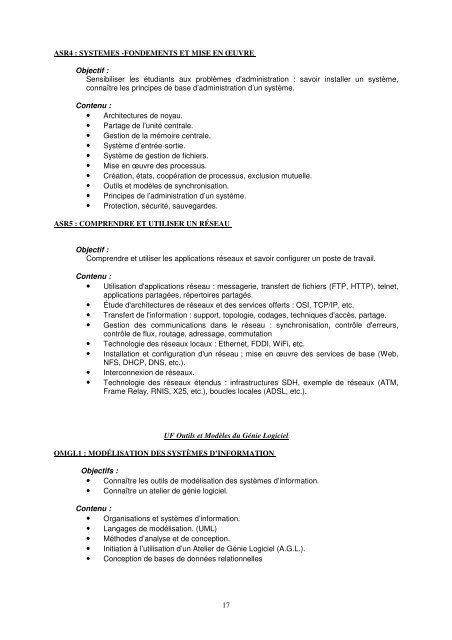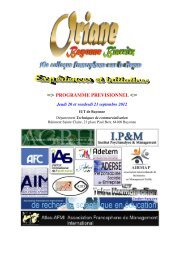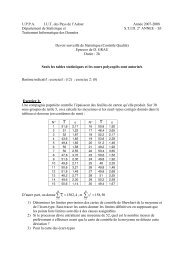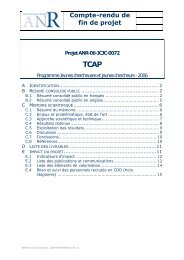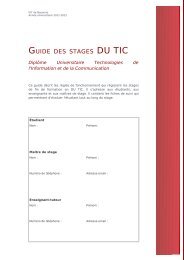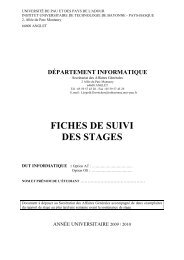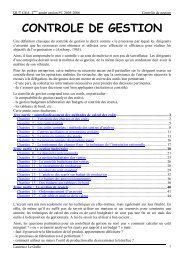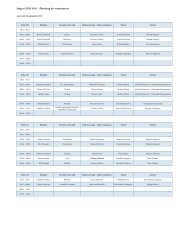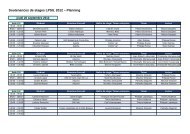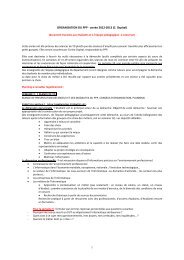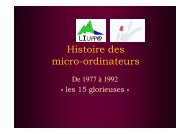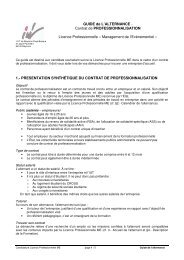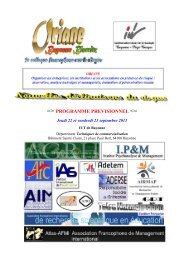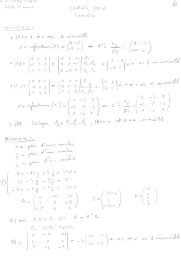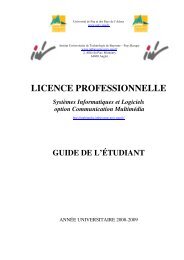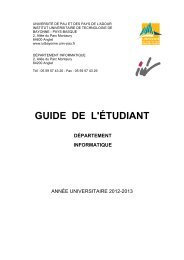Guide et fiches de suivi des stages 2012-2013 - IUT Bayonne
Guide et fiches de suivi des stages 2012-2013 - IUT Bayonne
Guide et fiches de suivi des stages 2012-2013 - IUT Bayonne
You also want an ePaper? Increase the reach of your titles
YUMPU automatically turns print PDFs into web optimized ePapers that Google loves.
ASR4 : SYSTEMES -FONDEMENTS ET MISE EN ŒUVRE<br />
Objectif :<br />
Sensibiliser les étudiants aux problèmes d'administration : savoir installer un système,<br />
connaître les principes <strong>de</strong> base d’administration d’un système.<br />
Contenu :<br />
• Architectures <strong>de</strong> noyau.<br />
• Partage <strong>de</strong> l’unité centrale.<br />
• Gestion <strong>de</strong> la mémoire centrale.<br />
• Système d’entrée-sortie.<br />
• Système <strong>de</strong> gestion <strong>de</strong> fichiers.<br />
• Mise en œuvre <strong>de</strong>s processus.<br />
• Création, états, coopération <strong>de</strong> processus, exclusion mutuelle.<br />
• Outils <strong>et</strong> modèles <strong>de</strong> synchronisation.<br />
• Principes <strong>de</strong> l’administration d’un système.<br />
• Protection, sécurité, sauvegar<strong>de</strong>s.<br />
ASR5 : COMPRENDRE ET UTILISER UN RÉSEAU<br />
Objectif :<br />
Comprendre <strong>et</strong> utiliser les applications réseaux <strong>et</strong> savoir configurer un poste <strong>de</strong> travail.<br />
Contenu :<br />
• Utilisation d'applications réseau : messagerie, transfert <strong>de</strong> fichiers (FTP, HTTP), teln<strong>et</strong>,<br />
applications partagées, répertoires partagés.<br />
• Étu<strong>de</strong> d'architectures <strong>de</strong> réseaux <strong>et</strong> <strong>de</strong>s services offerts : OSI, TCP/IP, <strong>et</strong>c.<br />
• Transfert <strong>de</strong> l'information : support, topologie, codages, techniques d'accès, partage.<br />
• Gestion <strong>de</strong>s communications dans le réseau : synchronisation, contrôle d'erreurs,<br />
contrôle <strong>de</strong> flux, routage, adressage, commutation<br />
• Technologie <strong>de</strong>s réseaux locaux : Ethern<strong>et</strong>, FDDI, WiFi, <strong>et</strong>c.<br />
• Installation <strong>et</strong> configuration d'un réseau ; mise en œuvre <strong>de</strong>s services <strong>de</strong> base (Web,<br />
NFS, DHCP, DNS, <strong>et</strong>c.).<br />
• Interconnexion <strong>de</strong> réseaux.<br />
• Technologie <strong>de</strong>s réseaux étendus : infrastructures SDH, exemple <strong>de</strong> réseaux (ATM,<br />
Frame Relay, RNIS, X25, <strong>et</strong>c.), boucles locales (ADSL, <strong>et</strong>c.).<br />
UF Outils <strong>et</strong> Modèles du Génie Logiciel<br />
OMGL1 : MODÉLISATION DES SYSTÈMES D’INFORMATION<br />
Objectifs :<br />
• Connaître les outils <strong>de</strong> modélisation <strong>de</strong>s systèmes d’information.<br />
• Connaître un atelier <strong>de</strong> génie logiciel.<br />
Contenu :<br />
• Organisations <strong>et</strong> systèmes d’information.<br />
• Langages <strong>de</strong> modélisation. (UML)<br />
• Métho<strong>de</strong>s d’analyse <strong>et</strong> <strong>de</strong> conception.<br />
• Initiation à l’utilisation d’un Atelier <strong>de</strong> Génie Logiciel (A.G.L.).<br />
• Conception <strong>de</strong> bases <strong>de</strong> données relationnelles<br />
17


